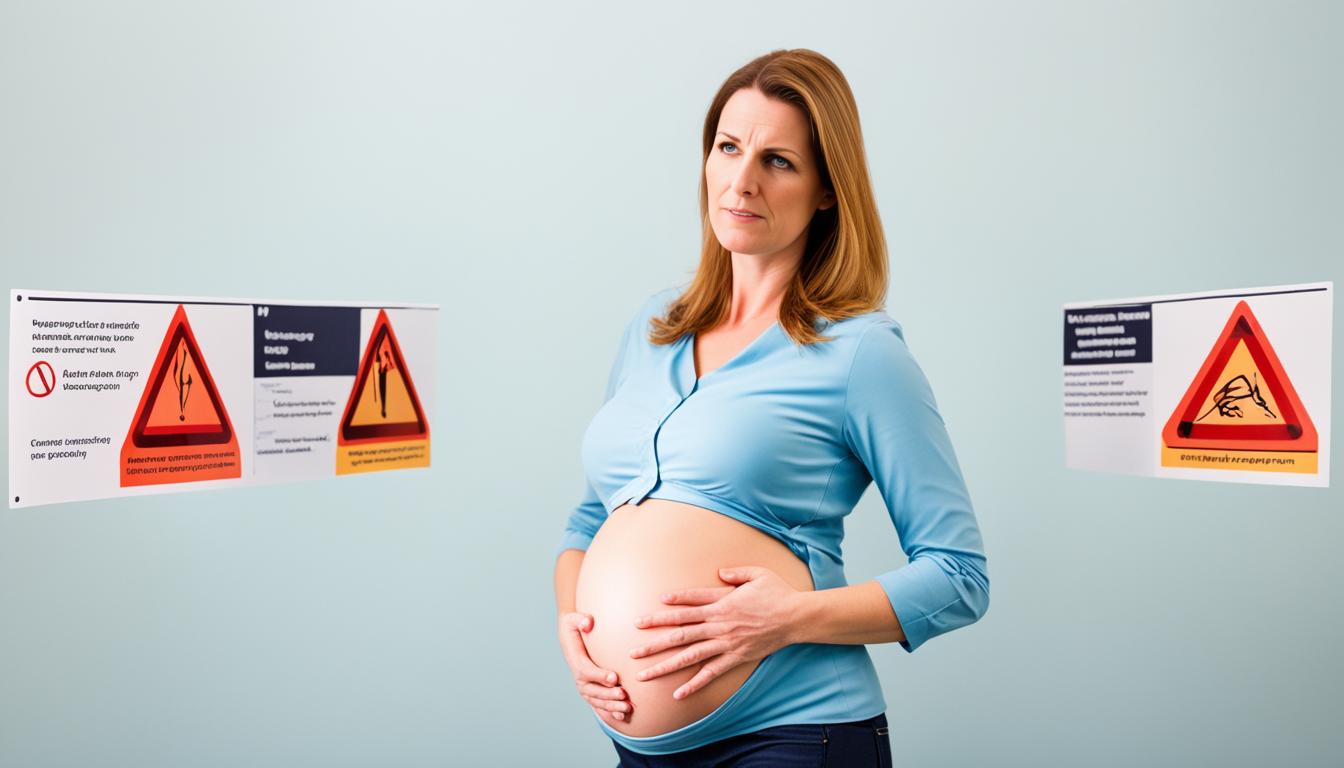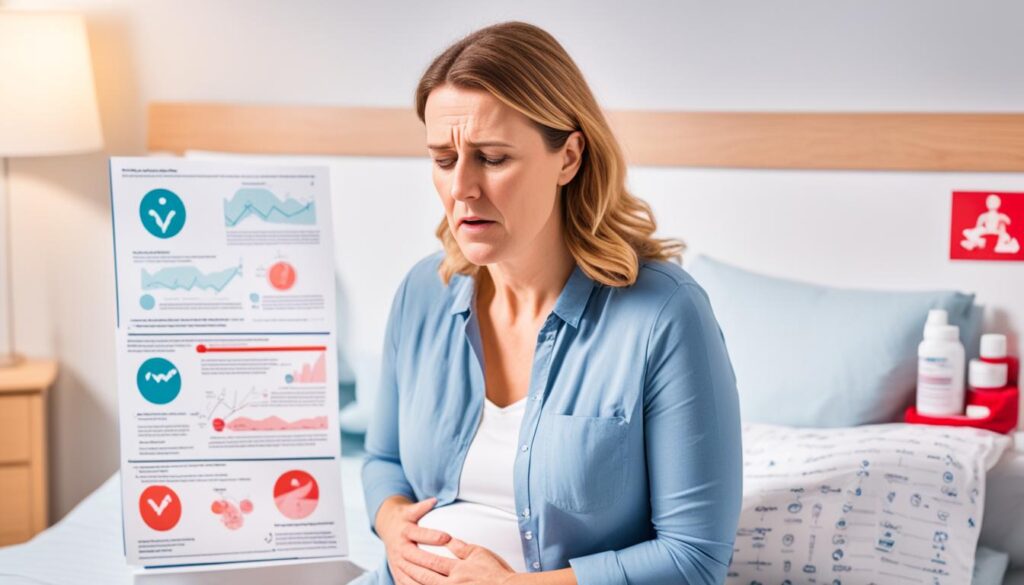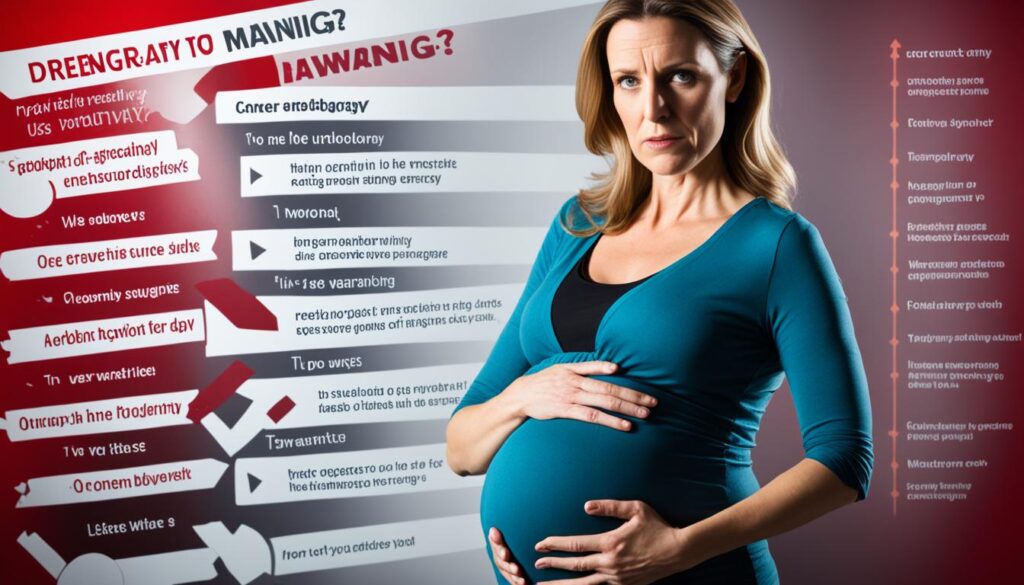First Trimester
Yoga Poses for the First Trimester: A Beginner's Guide
A beginner's guide to yoga poses for the first trimester offers essential techniques for pregnant individuals seeking comfort and well-being.

Were you aware that research indicates more than 80% of expectant persons feel back pain at some point during their initial trimester? It’s significantly helpful to know the proper ways to do yoga safely during this crucial time.
From gentle stretches to calming breathing exercises, incorporating yoga can help alleviate discomfort and promote overall well-being.
But what specific poses should one focus on? Let's explore some beginner-friendly yoga poses tailored for the first trimester and how they can support your journey through pregnancy.
Key Takeaways
- Standing poses like Mountain and Tree promote strength, flexibility, and stability without belly pressure.
- Seated poses like Bound Angle and Easy enhance flexibility, circulation, and posture support.
- Restorative poses like Supported Bridge and Child's Pose relieve muscle tension and promote relaxation.
- Balancing poses like Tree and Warrior III improve stability, concentration, and mindfulness amidst body changes.
Gentle Standing Poses
During the first trimester of pregnancy, incorporating gentle standing poses into our yoga practice can enhance balance, strength, and circulation. These poses offer stability and grounding while avoiding excessive pressure on the belly, making them ideal for expecting mothers. Standing poses like Mountain Pose and Tree Pose are particularly beneficial for building strength and flexibility in a safe manner. By practicing these gentle standing poses, we can effectively release tension in the body, fostering a sense of calmness and well-being during this transformative time.
Engaging in standing poses during the first trimester can also help prepare our bodies for the changes that lie ahead. These poses focus on the lower back, legs, and core, areas that are essential for supporting the body as it adapts to pregnancy. By incorporating standing poses into our routine, we not only promote physical health but also cultivate a mindful connection to our changing bodies, fostering a sense of empowerment and readiness for the journey ahead.
Seated Yoga Poses

Seated yoga poses in the first trimester of pregnancy offer a gentle way to enhance flexibility, promote relaxation, and prepare the body for the changes ahead. These poses, such as Bound Angle Pose (Baddha Konasana) and Easy Pose (Sukhasana), can be easily modified for comfort and safety, allowing for gentle stretches that benefit the hips, back, and pelvis.
By incorporating these seated poses into your routine, you not only work on maintaining good posture but also find relief from tension and stress. During the first trimester, these poses support better circulation, reduce stress levels, and enhance overall well-being.
Seated Forward Bend is another excellent posture to include, aiding in flexibility and calming the mind. As beginners and pregnant individuals, these seated yoga poses offer a foundation for a healthy practice during the initial stages of pregnancy.
Relaxing Restorative Poses
To promote relaxation and alleviate tension in the first trimester of pregnancy, incorporating relaxing restorative poses into your practice can be highly beneficial. During this period, when lower back discomfort and overall tension may be present, these poses offer a way to find comfort and release.
Supported Bridge pose, using props like bolsters and blocks, provides a gentle backbend that can help ease muscle tightness and promote relaxation. Child's Pose is another excellent option as it not only helps with tension release but can also assist in managing any feelings of nausea that may arise during the early stages of pregnancy. Additionally, modifying Child's Pose as your belly grows ensures ongoing comfort and support.
Lastly, the Constructive Rest pose, with arms positioned in a T shape, is effective in releasing tension in the lower back and fostering a sense of calm. Incorporating these restorative poses into your routine can contribute significantly to your well-being during the first trimester.
Balancing Poses

Engaging in balancing poses during the first trimester of pregnancy enhances stability, focus, and concentration while supporting core strength and overall body alignment. These poses, such as Tree Pose (Vrksasana) and Warrior III (Virabhadrasana III), not only improve physical stability but also help in fostering mindfulness amidst the changes the body undergoes. Balancing poses challenge coordination, which can be especially beneficial during pregnancy when balance might be affected. They aid in building core strength, essential for supporting the spine as the body changes. Additionally, practicing these poses can alleviate stress by promoting a sense of calm and improve posture, which may shift due to the body's adjustments. By incorporating balancing poses into a routine, pregnant individuals can find relief, enhance their focus, and boost their confidence throughout this transformative journey.
| Balancing Poses | Benefits |
|---|---|
| Tree Pose | Improves stability |
| Warrior III | Enhances concentration |
| Builds core strength | |
| Supports body alignment |
Breathing Exercises
Exploring controlled breathing techniques is integral during the first trimester of pregnancy to optimize oxygen flow, relaxation, and overall well-being for both the mother and the baby. Deep breathing exercises play a vital role in enhancing oxygen supply to the baby while promoting a sense of calm and reducing stress levels for the mother. Here are three key benefits of incorporating mindful breathing techniques in prenatal yoga sessions:
- Managing Labor Pain: Practicing controlled breathing techniques can help expectant mothers cope with labor pain by promoting relaxation and reducing the perception of discomfort during contractions.
- Reducing Anxiety Levels: Mindful breathing techniques in prenatal yoga sessions aid in lowering anxiety levels, fostering a sense of peace and tranquility, which can positively impact both maternal and fetal well-being.
- Enhancing Overall Well-Being: Proper breathing exercises support the body in adapting to physical changes during pregnancy, promoting overall health and vitality for the mother and the baby. Consultation with a healthcare provider is vital to ensure that breathing practices are safe and beneficial throughout the first trimester.
Are the Yoga Poses for the First Trimester Safe for Pregnancy?
Yes, many yoga poses are safe pregnancy ab exercises during the first trimester. However, it is crucial to listen to your body and avoid any poses that cause discomfort or strain. Always consult with your healthcare provider before starting any new exercise routine during pregnancy.
Conclusion
As we gently flow through the poses, we envision a serene garden, each movement a delicate petal unfurling in the morning sun. With each breath, we nurture our bodies and our growing baby, feeling a sense of peace and strength wash over us.
Remember, in the first trimester, listen to your body, honor its wisdom, and embrace the journey ahead with grace and mindfulness.
Namaste.
Nancy combines her love for writing with a deep understanding of the diverse dynamics of family life. As a parent, she brings personal experience and empathy to her work, covering topics from early childhood to the teenage years. Nancy’s work is driven by the belief that every family’s story is unique, and sharing these stories can inspire and support others on their parenting journey.
First Trimester
Early Pregnancy Risks: Spotting Danger Signs

For us women, the pregnancy journey brims with expectancy, happiness, and at times, a bit of concern. We look forward to every landmark event, starting from the initial confirmation of pregnancy to experiencing the gentle flutters. However, amidst this joy, it’s important to stay informed about possible complications that might occur during the early phases of pregnancy.
During the first trimester, our bodies undergo numerous changes as a new life takes shape within us. While many of these changes are perfectly normal, there are also danger signs that we need to pay attention to. Recognizing these signs and seeking immediate medical help can be crucial in safeguarding our health and the well-being of our little ones.
From experiencing spotting to facing severe abdominal pain, there are certain symptoms that should raise alarm bells. It’s essential for us to know when to reach out for help and when to share our concerns with our healthcare providers. By being proactive and vigilant, we can give ourselves the best chance of a healthy and safe pregnancy.
In this article, we will explore the common danger signs in early pregnancy, how to recognize potential problems, when to seek medical help, and steps to prevent complications. Let’s dive in and empower ourselves with the knowledge and understanding we need to navigate this beautiful yet delicate phase of our lives.
How Can I Tell if There is a Problem with My Pregnancy?
Pregnancy is a beautiful journey filled with various changes, but it’s important to be aware of potential problems that may arise. Recognizing the signs of pregnancy complications can help ensure the health and well-being of both you and your baby. Here are some key signs to watch out for:
- Decreased fetal movement: If you notice a significant decrease in your baby’s movements, it’s important to seek medical advice. While some changes in movement are normal, a sudden decrease may indicate a problem.
- Injury to the abdomen: If you experience any trauma to your abdomen, such as a fall or a direct impact, it’s essential to seek immediate medical attention. Even if you do not feel immediate pain, it’s better to be safe than sorry.
- Severe abdominal pain: Intense or persistent abdominal pain that is accompanied by other symptoms should not be ignored. It could be a sign of a serious condition that requires medical assessment.
- Bleeding from the vagina: Any amount of bleeding during pregnancy should be reported to your healthcare provider. While it may be harmless, it can also be a symptom of a more significant issue.
- Blurred vision: Vision changes, such as sudden blurriness or seeing spots, can indicate high blood pressure or preeclampsia. These conditions require prompt medical attention.
- Sudden swelling: Swelling of the face, hands, legs, or feet that appears suddenly and is accompanied by other symptoms may be a sign of a problem. It’s important to seek medical evaluation to determine the cause.
- Persistent headache: If you experience a severe headache that does not go away, especially if it is accompanied by other concerning symptoms, it’s crucial to consult your healthcare provider.
Remember, it’s always better to be cautious and seek medical advice if you have any concerns about your pregnancy. Your healthcare provider is there to support you and ensure the best possible outcomes for you and your baby.

Which Symptoms Should I Get Checked Out?
Throughout pregnancy, there are certain symptoms that should prompt you to seek medical help. These include:
- Severe nausea or vomiting
- Heavy bleeding from the vagina
- Severe abdominal pain
- Clear fluid leaking from the vagina
- Fever or chills
- Shortness of breath or a racing heart
- Pain or swelling in one leg
- Problems with emotional health lasting longer than 2 weeks
- Unusual vaginal discharge
- Weight loss
- Urgency or pain when urinating
- Swelling in the legs that doesn’t improve overnight
If you experience any of these symptoms, it’s important to contact your doctor or midwife for further evaluation and guidance.
Example Quote:
“It’s always better to be safe than sorry. Don’t hesitate to reach out to your healthcare provider if you have any concerning symptoms that could indicate a problem during pregnancy.”
We’re here to support you every step of the way.
Reasons to Seek Medical Help:
| Symptoms | Reason to Seek Help |
|---|---|
| Severe nausea or vomiting | This could be a sign of a condition called hyperemesis gravidarum, which may require medical treatment. |
| Heavy bleeding from the vagina | Heavy bleeding can indicate a potential miscarriage or other complications that need immediate attention. |
| Severe abdominal pain | Severe abdominal pain may be a sign of ectopic pregnancy or other serious conditions that require medical intervention. |
| Clear fluid leaking from the vagina | This could indicate the rupture of the amniotic sac and may require assessment to prevent infection. |
| Fever or chills | A persistent fever or chills can be a sign of infection, which needs to be evaluated and treated during pregnancy. |
| Shortness of breath or a racing heart | These symptoms may be a sign of a heart or lung condition that requires medical attention during pregnancy. |
| Pain or swelling in one leg | This could be a symptom of a blood clot, known as deep vein thrombosis, which is a serious complication requiring immediate medical care. |
| Problems with emotional health lasting longer than 2 weeks | If you experience persistent feelings of sadness, anxiety, or depression during pregnancy, it’s important to seek support from a healthcare professional. |
| Unusual vaginal discharge | Changes in vaginal discharge, such as an unusual odor, color, or consistency, may indicate an infection that needs treatment during pregnancy. |
| Weight loss | Significant or sudden weight loss during pregnancy can be a cause for concern and should be evaluated by a healthcare provider. |
| Urgency or pain when urinating | These symptoms may be signs of a urinary tract infection or other urinary issues that require medical attention during pregnancy. |
| Swelling in the legs that doesn’t improve overnight | Persistent swelling in the legs, especially if it does not improve with elevation and rest, may be a sign of a circulation problem or preeclampsia and should be evaluated by a healthcare provider. |
Warning Signs During Early Pregnancy
In the early stages of pregnancy, it’s important to be aware of the warning signs that may indicate a potential problem. If you experience any of these signs, it’s crucial to contact your healthcare provider immediately.
Signs to Watch Out For
- Severe pain or cramping in the lower abdomen: This could be a sign of an ectopic pregnancy or a miscarriage.
- Pain in the tip of one shoulder: This may indicate bleeding inside the abdomen, which requires immediate medical attention.
- Dizziness or fainting: It’s important to seek medical help as this could be a sign of a decrease in blood flow to the brain.
- Changes to vision: Blurry vision or other changes in eyesight should be evaluated by a healthcare professional.
- Sudden severe swelling in the hands, feet, or face: This may be a symptom of preeclampsia, a serious condition that requires medical intervention.
- A headache that doesn’t improve with pain-relieving medicine: This persistent headache could be a sign of high blood pressure.
- Pain under the ribs: Severe pain in the upper abdomen may indicate liver or gallbladder complications.
- Extreme itchiness of the skin: Itching, especially on the hands and feet, can be a symptom of a liver disorder called intrahepatic cholestasis of pregnancy.
- Swelling in the legs that doesn’t improve overnight: Persistent swelling in the legs could be a sign of deep vein thrombosis (DVT), a blood clot that requires immediate attention.
If you experience any of these warning signs, don’t hesitate to reach out to your healthcare provider. It’s essential to prioritize your health and the health of your baby during pregnancy.
Warning Signs in Later Pregnancy
In the later stages of pregnancy, it’s crucial to be aware of the warning signs that may arise. These signs should not be ignored as they can indicate potential complications. By recognizing these signs early on, you can seek the necessary medical attention to safeguard your health and the well-being of your baby.
Changes to Vision
One important warning sign to look out for is changes to your vision. Some women may experience flashing lights or blurry eyesight during pregnancy. These visual disturbances can be a cause for concern and may indicate an underlying issue. It’s essential to bring any changes in vision to the attention of your healthcare provider.
Sudden Severe Swelling in Hands, Feet, or Face
Another warning sign to take seriously is sudden and severe swelling in your hands, feet, or face. While swelling is common during pregnancy, excessive or rapid swelling can be indicative of preeclampsia, a serious condition that can affect both mother and baby. If you notice unusual swelling, especially if it appears suddenly, it’s essential to contact your healthcare provider without delay.
Headache That Doesn’t Improve with Pain-Relieving Medicine
Headaches are a common discomfort during pregnancy, but if you experience a persistent headache that doesn’t improve with pain-relieving medication, it may be a warning sign. A severe, unrelenting headache can be a symptom of high blood pressure or other complications. Don’t hesitate to consult with your healthcare provider to determine the cause and appropriate course of action.
Pain Under the Ribs
If you’re experiencing pain under your ribs, it’s important to bring it to your healthcare provider’s attention. This could be a sign of a liver condition or other complications requiring medical assessment and management.
Extreme Itchiness of the Skin, Especially Hands and Feet
While some itching is normal during pregnancy due to stretching skin, if you experience extreme itchiness, particularly in your hands and feet, it may indicate a liver disorder known as cholestasis. Prompt medical evaluation is essential to protect your health and the health of your baby.
Swelling in the Legs That Doesn’t Improve Overnight
Lastly, swelling in the legs that doesn’t improve overnight should not be disregarded. This persistent swelling could be a sign of a blood clot or poor circulation, which can have serious implications for both you and your baby. Contact your healthcare provider immediately if you notice this symptom.
Remember, if you experience any of these warning signs in later pregnancy, it’s crucial to contact your healthcare provider immediately. Early intervention and appropriate medical care are key to ensuring a healthy pregnancy and the best possible outcome for you and your baby.

What Will Happen When I See My Doctor or Midwife?
When you visit your doctor or midwife during pregnancy, they will conduct a thorough examination to ensure your well-being and monitor your baby’s health. They will also inquire about any symptoms you may be experiencing.
If you’re unsure about your symptoms or have any concerns, it’s essential to communicate them openly with your healthcare provider. Remember, they are there to provide you with the necessary care and support.
During your check-up, your doctor or midwife may perform various tests to assess your overall health and the development of your baby. These tests can include:
- Blood tests: to check your blood type, iron levels, and screen for any infections.
- Ultrasounds: to monitor the growth and development of your baby, as well as evaluate the placenta and amniotic fluid levels.
- Urine tests: to detect any urinary tract infections, protein, or glucose in your urine.
- Fetal monitoring: to assess the baby’s heart rate, movements, and overall well-being.
Based on the results of these tests and your individual circumstances, your doctor or midwife will determine the best course of action. This may involve additional monitoring throughout your pregnancy or even the possibility of an earlier delivery.
It’s essential to follow the recommendations of your healthcare provider to ensure a healthy pregnancy for both you and your baby.
Quote:
“Regular check-ups with your doctor or midwife during pregnancy play a crucial role in monitoring your health and well-being, as well as ensuring the optimal development of your baby.” – Dr. Emily Johnson
How Can I Avoid Pregnancy Complications?
While it’s not always possible to prevent complications in pregnancy, there are steps you can take to lower your risk. Attending all your antenatal appointments is crucial as it allows for early detection and treatment of any health issues.
Add daily appointments to the calendar; they help us track the progress of our pregnancy and ensure that both our baby and we are healthy.
Additionally, maintaining a healthy balanced diet, engaging in regular physical activity, maintaining a healthy weight, and avoiding alcohol, smoking, and drug use can contribute to a healthier pregnancy.

Avoiding alcohol, smoking, and drug use is essential, as they can harm our baby’s development and increase the risk of complications. Let’s stay away from these harmful substances and prioritize the well-being of our little one.
Remember, a healthy lifestyle during pregnancy not only benefits us but also gives our baby the best start in life.
If you have any pre-existing health conditions or a history of complications in previous pregnancies, it’s important to discuss these with your healthcare provider for appropriate management. Our healthcare provider will guide us on how to manage our condition during pregnancy and ensure the best possible outcomes for both us and our baby.
By taking these steps, we can reduce the risk of pregnancy complications and promote a healthy, happy pregnancy. Let’s prioritize our well-being and our baby’s health by following these guidelines.
Resources and Support
If you have any concerns during pregnancy, you can contact your doctor, midwife, or maternity hospital for guidance and support. Additionally, services like healthdirect and Pregnancy, Birth and Baby offer resources and support through helplines and online platforms. Maternal child health nurses are also available to provide guidance and answer questions. It’s important to reach out for support if you have any worries or questions about your pregnancy.
Bleeding and Spotting in Pregnancy
Bleeding and spotting can occur during pregnancy, and while they may not always indicate a problem, it’s essential to understand their potential causes and implications. About 25% of pregnant women experience some form of bleeding or spotting, which can be attributed to various factors. However, it’s important to remember that these symptoms can also be signs of complications or even miscarriage. If you experience bleeding or spotting, it’s crucial to contact your healthcare provider for a thorough evaluation and appropriate management.
There are several possible causes of bleeding and spotting during pregnancy. These include:
- Implantation: Light bleeding or spotting can occur when the fertilized egg attaches to the lining of the uterus.
- Hormone changes: Fluctuations in hormone levels can cause vaginal bleeding or spotting.
- Infections: Certain infections, such as urinary tract infections or sexually transmitted infections, may lead to bleeding or spotting.
- Certain tests during pregnancy: In some cases, diagnostic tests like a pelvic exam or a transvaginal ultrasound may cause minor bleeding or spotting.
- Complications: Serious conditions like ectopic pregnancy or molar pregnancy can cause bleeding or spotting, which necessitates immediate medical attention.
If you experience bleeding or spotting during pregnancy, contact your healthcare provider promptly. They will evaluate your symptoms, conduct necessary tests, and provide appropriate guidance and management tailored to your specific situation.
Communicating Danger Signs and Complications
At [brand name], we understand the importance of effectively communicating pregnancy danger signs and complications. It is crucial for the well-being of expectant mothers, their families, and the broader community. By educating individuals about the signs and symptoms of complications, we aim to empower them to take prompt action and seek timely care.
When discussing pregnancy danger signs, it is essential to use clear language and familiar terms that resonate with the audience. By avoiding medical jargon and using local words and explanations, we can improve understanding and recognition of these signs. Our goal is to ensure that every person, regardless of their background or education, can easily identify potential danger signs and seek help when needed.
In addition to educating individuals, we believe in the power of collaboration. By working together with other healthcare providers and community groups, we can raise awareness and reach a larger audience. Through partnerships and joint initiatives, we can ensure that accurate information about danger signs and complications reaches as many people as possible.
Supporting Birth and Emergency Plans
One way we support individuals in recognizing danger signs and complications is by providing guidance in developing birth and emergency plans. These plans outline the necessary steps to take in case of an emergency, including who to contact and where to seek immediate care. By encouraging individuals to create these plans, we equip them with the tools to respond effectively in critical situations.
“Preparing for emergencies can save lives. By educating individuals about pregnancy danger signs and complications, we empower them to protect their health and the health of their babies.” – [Expert Name], [Title]
Community Outreach and Awareness
Community outreach plays a vital role in ensuring that the message about pregnancy danger signs and complications reaches all individuals. Through workshops, seminars, and informational campaigns, we strive to raise awareness and educate community members about the importance of seeking timely care. By engaging with the community and providing culturally sensitive and relevant information, we contribute to a healthier and safer pregnancy experience.
Collaboration in Action
| Partnerships | Activities | Impact |
|---|---|---|
| [Hospital Name] | Joint educational workshops for expectant mothers | Increased awareness and early detection of complications |
| [Community Organization] | Distribution of informational brochures in local communities | Improved knowledge and recognition of danger signs |
| [Health Agency] | Collaborative social media campaign | Widespread dissemination of information to a larger audience |
By actively engaging with healthcare providers, community organizations, and government agencies, we can work together to ensure that the message about pregnancy danger signs and complications is effectively communicated to all individuals. Together, we can make a difference in promoting healthier pregnancies and reducing the risk of complications.
Conclusion
Recognizing danger signs and complications during pregnancy is vital for ensuring the health and well-being of both the mother and the baby. By being aware of the warning signs and seeking prompt medical help, potential complications can be detected and managed effectively. It’s crucial for women, their families, and the community to have access to accurate information and support in order to respond appropriately during pregnancy.
Remember, if you experience any concerning symptoms, don’t hesitate to contact your healthcare provider for guidance and care. Seeking medical help promptly can make all the difference in ensuring a healthy pregnancy and positive outcomes for both the mother and the baby.
With the right knowledge, resources, and support, we can work together to prioritize the well-being of expectant mothers and promote a safe and healthy pregnancy journey for all.
Should I be Concerned about Spotting during Early Pregnancy if I Notice Changes in Poop Color during the First Trimester?
Spotting during early pregnancy is common, but changes in poop color may warrant a doctor’s visit. Monitoring poop color changes in pregnancy is important, as it could indicate potential issues. It’s best to get any unusual symptoms checked out for peace of mind.
FAQ
What are some danger signs of pregnancy during the first trimester?
Some danger signs of pregnancy during the first trimester include bleeding from the vagina, severe abdominal pain, blurred vision, swelling, and a bad headache that doesn’t go away. If you experience any of these symptoms, it’s crucial to seek immediate help.
How can I tell if there is a problem with my pregnancy?
Signs that may indicate a problem with your pregnancy include decreased fetal movement, an injury to the abdomen, severe abdominal pain, bleeding from the vagina, blurred vision, sudden swelling, and a persistent headache. It’s best to get any concerns checked out by your doctor or midwife.
What symptoms during pregnancy should I get checked out?
Symptoms during pregnancy that should prompt you to seek medical help include severe nausea or vomiting, heavy bleeding from the vagina, severe abdominal pain, clear fluid leaking from the vagina, fever or chills, shortness of breath or a racing heart, pain or swelling in one leg, problems with emotional health lasting longer than 2 weeks, unusual vaginal discharge, weight loss, urgency or pain when urinating, and swelling in the legs that doesn’t improve overnight. Contact your doctor or midwife if you experience any of these symptoms.
What are the warning signs during early pregnancy?
Warning signs during early pregnancy that should not be ignored include severe pain or cramping in the lower abdomen, pain in the tip of one shoulder, dizziness or fainting, changes to vision, sudden severe swelling in the hands, feet or face, a headache that doesn’t improve with pain-relieving medicine, pain under the ribs, extreme itchiness of the skin, and swelling in the legs that doesn’t improve overnight. If you experience any of these signs, contact your healthcare provider immediately.
What are the warning signs in later pregnancy?
Warning signs in later pregnancy that should not be ignored include changes to vision such as flashing lights or blurry eyesight, sudden severe swelling in the hands, feet, or face, a headache that doesn’t improve with pain-relieving medicine, pain under the ribs, extreme itchiness of the skin (especially hands and feet), and swelling in the legs that doesn’t improve overnight. If you experience any of these signs, contact your healthcare provider immediately.
What will happen when I see my doctor or midwife?
When you see your doctor or midwife, they will ask about your symptoms and perform an examination. They may also conduct tests such as blood tests, ultrasounds, urine tests, and fetal monitoring to check your and your baby’s health. Your doctor or midwife will determine the appropriate treatment based on your individual circumstances and the cause of your symptoms.
How can I avoid pregnancy complications?
To lower your risk of pregnancy complications, attend all your antenatal appointments for early detection and treatment of any health issues. Maintain a healthy balanced diet, engage in regular physical activity, maintain a healthy weight, and avoid alcohol, smoking, and drug use. If you have any pre-existing health conditions or a history of complications in previous pregnancies, discuss these with your healthcare provider for appropriate management.
Where can I find resources and support during pregnancy?
If you have any concerns during pregnancy, you can contact your doctor, midwife, or maternity hospital for guidance and support. Services like healthdirect and Pregnancy, Birth and Baby offer resources and support through helplines and online platforms. Maternal child health nurses are also available to provide guidance and answer questions.
What causes bleeding and spotting during pregnancy?
Bleeding and spotting can occur during pregnancy and may not always indicate a problem. Causes of bleeding and spotting can vary, including implantation, hormone changes, infections, certain tests during pregnancy, and complications like ectopic pregnancy or molar pregnancy. It’s important to contact your healthcare provider if you experience bleeding or spotting for evaluation and appropriate management.
How can danger signs and complications during pregnancy be effectively communicated?
It is crucial to effectively communicate danger signs and complications during pregnancy by discussing the signs, emphasizing the importance of seeking timely care, and providing support in developing birth and emergency plans. Clear communication in familiar terms, using local words and explanations, can help improve understanding and recognition of danger signs. Working with other healthcare providers and community groups can also raise awareness and ensure that all individuals have the necessary information to respond to a potential emergency.
Why is it important to recognize danger signs and complications during pregnancy?
Recognizing danger signs and complications during pregnancy is vital for ensuring the health and well-being of both the mother and the baby. By being aware of the warning signs and seeking prompt medical help, potential complications can be detected and managed effectively. Access to accurate information and support is essential for individuals to respond appropriately during pregnancy. If you experience any concerning symptoms, don’t hesitate to contact your healthcare provider for guidance and care.
Nancy combines her love for writing with a deep understanding of the diverse dynamics of family life. As a parent, she brings personal experience and empathy to her work, covering topics from early childhood to the teenage years. Nancy’s work is driven by the belief that every family’s story is unique, and sharing these stories can inspire and support others on their parenting journey.
First Trimester
Does Orgasm Cause Miscarriage in First Trimester?

Discovering I was expecting filled me with an immense sense of joy and exhilaration. However, this emotion was accompanied by a deluge of inquiries and concerns. A persistent worry of mine was the possibility that experiencing an orgasm in the first trimester might increase the risk of a miscarriage. It’s an uncomfortable consideration for any soon-to-be parent, creating a sense of anxiety and reluctancy towards being intimate with my partner.
I couldn’t shake off the worry, so I decided to do some research and speak to my healthcare provider. I wanted to know the truth and put my mind at ease. And what I found out brought a sense of relief and peace. It turns out that the majority of miscarriages are caused by chromosomal abnormalities in the embryo, not by sexual activity or orgasms during pregnancy.
This newfound knowledge was a game-changer for me. I felt empowered to embrace intimacy and sexual pleasure during this precious time in my life without fear or guilt. And I want you to feel the same sense of liberation.
So, let’s dive deeper into the topic and uncover the truth about orgasms, sex, and miscarriage in the first trimester. Together, we’ll explore the benefits of sexual activity during pregnancy, when it’s best to avoid sex, common concerns, and how to navigate any pain or discomfort that may arise.
Key Takeaways:
- Having an orgasm or engaging in sexual activity during the first trimester of pregnancy does not cause miscarriage in the majority of cases.
- Miscarriages are primarily caused by chromosomal abnormalities in the embryo.
- Consultation with a healthcare provider is essential for individualized guidance and support throughout pregnancy.
- Pregnant individuals with special circumstances should consult with their healthcare provider about the safety and appropriateness of sexual activity.
- Pregnancy hormones can have a significant impact on sexual desire and pleasure. Emotional well-being also plays a vital role in a person’s comfort with sex during pregnancy.
Benefits of Sex During Pregnancy
Sex during pregnancy can be a fulfilling and enjoyable experience for both partners. Not only does it foster intimacy, but it also offers a range of benefits that contribute to a healthy and positive pregnancy journey. Let’s explore the various advantages of sexual activity during pregnancy.
Increased Intimacy
Engaging in sexual activity during pregnancy can strengthen the emotional bond between partners. It provides an opportunity to connect intimately, fostering a sense of love, trust, and understanding. Exploring new ways to pleasure each other can deepen the emotional connection and help maintain a strong relationship during this transformative time.
Strengthened Pelvic Muscles
Sexual intercourse, particularly certain positions, can help tone and strengthen the pelvic muscles. Strong pelvic muscles play a crucial role during childbirth, as they support the uterus, bladder, and bowel. By engaging in regular sex, pregnant individuals can prepare their bodies for labor and improve postnatal recovery.
Better Sleep
Sexual activity releases endorphins, which are natural painkillers and mood enhancers. These endorphins, coupled with the release of oxytocin, commonly known as the “love hormone,” can promote relaxation and result in improved sleep quality. A restful night’s sleep is essential for pregnant individuals’ overall well-being, as it contributes to physical and emotional health.
Possible Boost to the Immune System
Engaging in sexual activity during pregnancy may have a positive impact on the immune system. It is believed that the exchange of bodily fluids during intercourse can introduce antibodies to the pregnant person’s body, potentially boosting their immune response. However, further research is needed to fully understand the extent and mechanisms of this benefit.

| Benefits of Sex During Pregnancy | Description |
|---|---|
| Increased Intimacy | Sexual activity fosters emotional connection and strengthens the bond between partners. |
| Strengthened Pelvic Muscles | Regular sex helps tone and prepare the pelvic muscles for childbirth. |
| Better Sleep | Sexual activity promotes relaxation, releases endorphins, and improves sleep quality. |
| Possible Boost to the Immune System | The exchange of bodily fluids during intercourse may introduce antibodies and potentially enhance the immune response. |
For pregnant individuals without specific complications or medical conditions, sex is generally safe and beneficial throughout all stages of pregnancy. It’s important to communicate openly with your partner and consult with your healthcare provider to ensure a comfortable and enjoyable sexual experience during this special time.
When Should You Avoid Sex During Pregnancy?
In some cases, healthcare providers may advise pregnant individuals to avoid sexual activity and orgasms. This advice may apply to those who have had a threat of miscarriage, a prior premature birth, premature contractions, an incompetent or dilated cervix, unexplained vaginal bleeding or discharge, or fluid leaking. It’s important to consult with a healthcare provider to determine what is safe and appropriate for individual circumstances.
| Risks and Complications | Description |
|---|---|
| Threat of miscarriage | Increased risk of pregnancy loss |
| Prior premature birth | Increased likelihood of preterm labor |
| Premature contractions | Increased risk of early labor |
| Incompetent or dilated cervix | Higher chance of cervical complications |
| Unexplained vaginal bleeding or discharge | Potential signs of underlying issues |
| Fluid leaking | Possible indication of amniotic fluid leakage |
“It’s important to consult with a healthcare provider to determine what is safe and appropriate for individual circumstances.”
Every pregnancy is unique, and the presence of any of these risks or complications does not automatically mean that sexual activity must be completely avoided. It is crucial to discuss your specific situation with a healthcare professional who can provide personalized guidance and support throughout your pregnancy.
Remember, communication with your healthcare provider is essential for a comprehensive understanding of the potential risks and benefits of engaging in sexual activity during pregnancy. Their expertise and guidance will ensure that you make informed decisions that prioritize your health and the well-being of your baby.
Common Concerns About Sex and Miscarriage
Many pregnant individuals have concerns about the potential link between sex, orgasms, and miscarriage. It’s natural to worry about the well-being of your pregnancy, but it’s important to understand the facts and dispel any unnecessary fears.
The truth is that the vast majority of miscarriages are caused by chromosomal abnormalities in the embryo, not by sexual activity or orgasms. In most cases, sex during pregnancy is safe and does not pose a risk to the pregnancy.
However, it’s important to pay attention to any unusual symptoms or complications that may arise after sex. Light bleeding or spotting after sex is generally not a cause for concern, especially if it resolves quickly and is not accompanied by severe pain or heavy bleeding.
If you experience any of the following symptoms after sex, it’s important to consult with your healthcare provider:
- Severe pain or cramping
- Heavy bleeding
- Unexplained or persistent vaginal discharge
- Fluid leaking from the vagina
While these symptoms are not common and usually not related to sexual activity, they could be indicators of underlying complications that require medical attention. It’s always best to seek professional guidance if you have any concerns.

Pain and Discomfort During Sex in the First Trimester
During the first trimester of pregnancy, some individuals may experience pain or discomfort during sexual activity. This can be attributed to various factors such as hormonal changes, vaginal dryness, increased pressure on the bladder, or soreness in the breasts or nipples. It’s important to remember that every pregnancy is different, and what may cause discomfort for one person may not affect another in the same way. The key is to communicate openly with your partner and seek guidance from a healthcare provider if sex becomes consistently painful or uncomfortable.
In the first trimester, hormonal shifts can lead to changes in the reproductive system, including vaginal dryness. This can result in discomfort or pain during intercourse. Using a water-based lubricant can help alleviate this issue and make sexual activity more comfortable.
The growing uterus can also put pressure on the bladder, causing urinary frequency and discomfort during intercourse. Emptying your bladder before engaging in sexual activity and exploring different positions may help minimize this discomfort.
Soreness in the breasts and nipples is a common symptom experienced during early pregnancy. This sensitivity can make sexual activity uncomfortable or painful. It’s important to inform your partner about these changes and find alternative positions or engage in different types of sexual intimacy that do not cause discomfort.
If you experience pain or discomfort during sex in the first trimester, it’s essential to reach out to a healthcare provider for guidance. They can provide personalized advice based on your specific situation and address any concerns or questions you may have.

Expert Tip:
It’s crucial to remember that the priority during pregnancy is the comfort and well-being of the expectant parent. If any form of sexual activity causes pain or discomfort, it’s important to communicate openly with your partner and seek guidance from a healthcare professional. They can offer insight into possible causes and suggest alternative methods of intimacy that do not involve pain or discomfort.
Cramping After Sex in the First Trimester
It’s not uncommon to experience mild cramping after sex in the first trimester. Orgasms and semen can both cause uterine contractions, which may lead to mild cramping for a few hours.
As long as the cramps are mild and resolve shortly after sex, there is usually no cause for concern. Resting and contacting a healthcare provider if the cramps persist can provide further reassurance.
Experiencing cramping after sex can be worrisome, but it’s important to understand that these cramps are generally harmless and a natural response of the uterus. The contractions experienced after sex are similar to those experienced during an orgasm, and they help the uterus in various ways.
During sex, the release of hormones and the physical stimulation lead to an increased blood flow to the uterus and pelvic area. This increased blood flow can trigger contractions, resulting in mild cramping. These contractions are how the body reacts to sexual activity and play a crucial role in the fertilization process.
While cramping after sex can be uncomfortable, it’s usually temporary and subsides within a few hours. Resting and avoiding strenuous activities can help alleviate any discomfort. If the cramps persist or become severe, it’s advisable to reach out to a healthcare provider for further evaluation and guidance.
Pregnant with Special Circumstances: Consult Your Doctor
Pregnant individuals with special circumstances require additional guidance and support to ensure a safe and healthy pregnancy. If you have a history of miscarriage, multiple-birth pregnancy, an incompetent cervix, signs of preterm labor, or placenta previa, it is crucial to consult with your healthcare provider regarding the safety and appropriateness of sexual activity during pregnancy. Each situation is unique, and the guidance of a medical professional will help you make informed decisions for your well-being.
The Importance of Consultation
When facing special circumstances during pregnancy, it becomes essential to consult with a doctor. A medical professional can assess your specific condition, consider any risks or complications, and provide personalized guidance tailored to you. Your doctor will have the knowledge and expertise to evaluate the potential impact of sexual activity on your pregnancy and advise you on the best course of action.
“Consultation with your healthcare provider is crucial for pregnant individuals with special circumstances to ensure the safety and appropriateness of sexual activity during pregnancy.”
Understanding Your Unique Situation
Each special circumstance comes with its own set of considerations and potential risks. By consulting your doctor, you will gain a comprehensive understanding of your unique situation and any precautions you need to take. Your healthcare provider will take into account factors such as your medical history, current condition, and any specific risks associated with your pregnancy to provide the most accurate and relevant advice.
Personalized Advice for Your Well-being
Consulting with your doctor ensures that you receive personalized advice that takes into account your overall well-being. Your healthcare provider will consider not only the specific circumstance but also your physical and emotional health. This holistic approach ensures that you make informed decisions that prioritize your safety, comfort, and the health of your pregnancy.
| Special Circumstances | Considerations |
|---|---|
| History of Miscarriage | Assess any potential risks and provide guidance. |
| Multiple-Birth Pregnancy | Evaluate the impact on both you and the babies. |
| Incompetent Cervix | Determine potential risks and precautions. |
| Signs of Preterm Labor | Address any potential triggers and recommendations. |
| Placenta Previa | Provide guidance on sexual activity and precautions. |
Consulting your doctor ensures that you receive personalized advice, specific to your unique situation. It allows you to navigate your pregnancy with confidence and peace of mind, knowing that you have the necessary support and guidance along the way.
The Role of Hormones and Emotional Well-being During Pregnancy
Pregnancy is a time of immense changes, both physically and emotionally. Hormones play a crucial role in regulating these changes and can have a significant impact on a person’s sexual desire and pleasure. Understanding the role of hormones and nurturing emotional well-being is essential for maintaining a positive and fulfilling sexual experience during pregnancy.
During pregnancy, hormone levels fluctuate, leading to unique changes in a pregnant individual’s body. One of these changes is an increase in libido, or sexual desire, for many expectant parents. The surge of pregnancy hormones can heighten sensitivity, making sexual activity more enjoyable and pleasurable. It’s important to note that every pregnancy is different, and individuals may experience varying degrees of hormonal changes.

Emotional well-being also plays a vital role in a person’s desire and comfort with sex during pregnancy. Pregnancy brings about a whirlwind of emotions, ranging from joy and excitement to anxiety and mood swings. Open communication with a partner about these feelings is key to maintaining emotional connection and support. Seeking emotional support from loved ones or joining support groups can also provide a safe space to express emotions and alleviate any concerns or anxieties.
Remember, your emotional well-being is just as important as your physical well-being during pregnancy. Discuss any concerns or anxieties you may have with your partner, healthcare provider, or a mental health professional. You deserve support and understanding as you navigate this transformative phase of your life.
To nurture emotional well-being during pregnancy, consider exploring relaxation techniques such as deep breathing exercises, meditation, or prenatal yoga. Engaging in activities that bring joy and reduce stress, such as spending quality time with loved ones, enjoying hobbies, or indulging in self-care routines can also contribute to overall emotional well-being.
As hormone levels and emotional well-being can vary throughout pregnancy, it’s important to adapt to individual needs and desires. Some pregnant individuals may find that their sexual desire fluctuates during different trimesters or stages of pregnancy. Open communication, patience, and understanding between partners are essential in navigating these changes together.
The Benefits of Hormone-related Changes in Pregnancy
The hormonal fluctuations experienced during pregnancy can bring about a range of benefits that contribute to both physical and emotional well-being. These benefits may include:
- Increased sexual desire and pleasure
- Heightened sensitivity and responsiveness
- Increased blood flow to the pelvic region
- Enhanced vaginal lubrication
- Release of feel-good hormones such as oxytocin
It’s important to note that every pregnancy is unique, and individuals may experience these benefits to varying degrees. The most crucial aspect is to prioritize open communication, emotional support, and consent between partners to foster a healthy and satisfying sexual experience throughout pregnancy.
Seeking Professional Advice
If you have any concerns or lingering questions about sex or orgasms during pregnancy, it’s always best to seek advice from a qualified OB-GYN or healthcare provider. They have the expertise to provide personalized guidance and address specific concerns related to your individual circumstances. Professional advice can help alleviate worries and ensure a safe and enjoyable sexual experience during pregnancy.
Why Consult an OB-GYN or Healthcare Provider?
Consulting an OB-GYN or healthcare provider during pregnancy is crucial for comprehensive healthcare and support. When it comes to sex and pregnancy, these experts can provide valuable insights, recommendations, and reassurance based on their medical knowledge and experience. They can address any concerns you may have and ensure that your sexual activity aligns with your overall wellness and pregnancy journey.
It’s important to remember that every pregnant individual’s experience is unique, and what works for one person may not work for another. Seeking professional advice allows you to receive personalized care tailored specifically to your needs.
What to Discuss with Your Healthcare Provider?
During your consultation, it’s essential to have an open and honest conversation with your healthcare provider about your concerns related to sex during pregnancy. Some topics you may want to discuss include:
- The safety of sexual activity during your specific stage of pregnancy
- Any complications, risks, or medical conditions that may influence your sexual activity
- Specific concerns about orgasms, discomfort, or pain during sex
- Changes in libido or sexual desire during pregnancy
- Any emotional or psychological factors impacting your sexual experience
Getting the Support You Need
Remember, seeking professional advice doesn’t just address your concerns about sex during pregnancy—it also provides you with the emotional support you may need. Your healthcare provider can offer guidance on maintaining open communication with your partner, managing any emotional changes, and tackling any challenges that may arise. Their expertise and compassionate care can help you navigate this unique time in your life with confidence and peace of mind.
| Benefits of Seeking Professional Advice | Why It’s Important |
|---|---|
| Personalized guidance | Ensures your specific needs and concerns are addressed |
| Reassurance and peace of mind | Reduces anxiety and allows you to enjoy your sexual experience |
| Comprehensive healthcare | Ensures your overall well-being throughout your pregnancy journey |
| Emotional support | Helps you manage emotional changes and challenges |
Conclusion
In conclusion, having an orgasm or engaging in sexual activity during the first trimester of pregnancy does not cause miscarriage in the majority of cases. Miscarriages are primarily caused by chromosomal abnormalities in the embryo. While there may be cases where sexual activity should be avoided due to specific complications or medical conditions, it is generally safe and beneficial for pregnant individuals to engage in sexual activity as long as there are no contraindications. Consultation with a healthcare provider is essential for individualized guidance and support throughout pregnancy. There is no evidence to suggest that orgasm during pregnancy increases the risk of miscarriage in the first trimester. However, chronic sleep deprivation and miscarriage may be linked. It’s important for pregnant women to prioritize rest and sleep to minimize any potential risks to their pregnancy. Sex and orgasms during pregnancy are generally safe and do not cause miscarriage. Miscarriages are mostly caused by chromosomal abnormalities in the embryo. Orgasms may cause uterine contractions, but these are typically harmless and do not lead to miscarriage. The baby is protected by the amniotic sac and strong uterine muscles, as well as a mucus plug that seals the cervix. Sex during pregnancy has numerous benefits, including increased intimacy, strengthened pelvic muscles, better sleep, and a possible boost to the immune system. Pregnancy hormones can also enhance pleasure during sexual activity. As long as there are no specific complications or medical conditions, sex is generally safe throughout all stages of pregnancy. In some cases, healthcare providers may advise pregnant individuals to avoid sexual activity and orgasms. This advice may apply to those who have had a threat of miscarriage, a prior premature birth, premature contractions, an incompetent or dilated cervix, unexplained vaginal bleeding or discharge, or fluid leaking. It’s important to consult with a healthcare provider to determine what is safe and appropriate for individual circumstances. Many pregnant individuals worry that sex or orgasms could cause a miscarriage. However, the vast majority of miscarriages are caused by chromosomal abnormalities and are not related to sexual activity. Light bleeding or spotting after sex is usually not a cause for concern unless it is accompanied by severe pain, heavy bleeding, or other symptoms of complications. It’s always best to consult with a healthcare provider if there are any concerns. Some pregnant individuals may experience pain or discomfort during sexual activity in the first trimester. This can be due to hormonal changes, vaginal dryness, increased pressure on the bladder, or soreness in the breasts or nipples. It’s important to communicate with your partner and consult with a healthcare provider if sex becomes consistently painful or uncomfortable. It’s not uncommon to experience mild cramping after sex in the first trimester. Orgasms and semen can both cause uterine contractions, which may lead to mild cramping for a few hours. As long as the cramps are mild and resolve shortly after sex, there is usually no cause for concern. Resting and contacting a healthcare provider if the cramps persist can provide further reassurance. Pregnant individuals with special circumstances, such as a history of miscarriage, multiple-birth pregnancy, an incompetent cervix, signs of preterm labor, or placenta previa, should consult with their healthcare provider about the safety and appropriateness of sexual activity during pregnancy. Each situation is unique, and it’s important to follow the guidance of a medical professional. Pregnancy hormones can have a significant impact on sexual desire and pleasure. Many pregnant individuals experience changes in hormone levels that can lead to increased libido and enjoyment of sexual activity. Emotional well-being also plays a crucial role in a person’s desire and comfort with sex during pregnancy. Open communication with a partner and seeking emotional support can contribute to a positive sexual experience during pregnancy. If there are any lingering questions or concerns about sex or orgasms during pregnancy, it’s always best to consult with an OB-GYN or healthcare provider. They can provide personalized advice and address specific concerns based on individual circumstances. Professional guidance and support can help alleviate worries and ensure a safe and enjoyable sexual experience during pregnancy. In conclusion, having an orgasm or engaging in sexual activity during the first trimester of pregnancy does not cause miscarriage in the majority of cases. Miscarriages are primarily caused by chromosomal abnormalities in the embryo. While there may be cases where sexual activity should be avoided due to specific complications or medical conditions, it is generally safe and beneficial for pregnant individuals to engage in sexual activity as long as there are no contraindications. Consultation with a healthcare provider is essential for individualized guidance and support throughout pregnancy.Can Orgasm During Pregnancy Increase the Risk of Miscarriage in the First Trimester?
FAQ
Does orgasm cause miscarriage in the first trimester?
What are the benefits of sex during pregnancy?
When should you avoid sex during pregnancy?
Are there concerns about sex and miscarriage during pregnancy?
Is it normal to experience pain and discomfort during sex in the first trimester?
Can cramping occur after sex in the first trimester?
What should pregnant individuals with special circumstances do?
How do hormones and emotional well-being affect sex during pregnancy?
When should you seek professional advice about sex during pregnancy?
In conclusion, what is important to know about orgasms and sex during pregnancy?
Nancy combines her love for writing with a deep understanding of the diverse dynamics of family life. As a parent, she brings personal experience and empathy to her work, covering topics from early childhood to the teenage years. Nancy’s work is driven by the belief that every family’s story is unique, and sharing these stories can inspire and support others on their parenting journey.
First Trimester
Safe Honey Consumption During Pregnancy: First Trimester Guide
Curious about consuming honey in the first trimester of pregnancy? Uncover essential tips for a healthier journey ahead.

Have you ever pondered the safety of eating honey in the first three months of pregnancy?
While honey can offer beneficial nutrients, there are important considerations to keep in mind for expectant mothers.
Exploring the dos and don'ts of honey consumption during this significant period can provide valuable insights for a healthier pregnancy journey.
Key Takeaways
- Consult healthcare provider for personalized advice on safe honey intake.
- Limit honey to 1-2 tbsp daily to balance nutrition and sugar intake.
- Opt for pasteurized honey from reliable sources to avoid bacterial risks.
- Moderation and awareness of risks ensure a healthier first trimester with honey consumption.
Benefits of Honey During Pregnancy
During pregnancy, consuming honey offers a range of essential nutrients and health benefits for expectant mothers. Honey is a safe and nutritious option for pregnant women as it contains crucial vitamins such as vitamin C, B6, and minerals like iron, calcium, and magnesium.
With its natural sweetening properties and approximately 76.4g of carbs per 100g, honey provides a healthier alternative to refined sugar, making it a valuable addition to a pregnancy diet. Additionally, honey boosts the immune system, provides quick energy, soothes a sore throat and cough, aids digestion, and supports skin health.
These benefits are particularly advantageous during pregnancy when the body's nutritional needs are heightened. Pregnant women can benefit from honey's antibacterial properties, which can help in maintaining overall health. When consumed in moderation and ensuring it's raw and safe, honey can be a beneficial addition to the diet of expectant mothers, offering both nutritional value and various health advantages.
Risks of Honey Consumption in Pregnancy

Pregnant women should exercise caution when consuming honey due to potential risks associated with certain bacterial contaminants. While raw honey is generally safe to eat during pregnancy, there's a minimal risk of bacterial contamination, specifically from Clostridium botulinum. This bacterium can cause botulism, a rare but serious illness. Although the placental barrier provides some protection, pregnant women with a history of gastrointestinal issues should avoid honey to prevent exacerbating their symptoms. It's advisable to consult a healthcare provider before including honey in the diet during pregnancy, especially if there are concerns about botulism.
Fortunately, the protective mechanisms in place make it unlikely for the bacteria causing botulism in honey to affect the unborn child directly. However, to guarantee the safety of both the mother and the baby, it's essential to be aware of these risks and take necessary precautions when considering honey consumption during pregnancy.
Recommended Honey Dosage for Pregnant Women
While honey consumption during pregnancy poses potential risks, pregnant women can safely incorporate honey into their diet by following the recommended dosage of 1-2 tablespoons per day. This moderate intake allows pregnant women to enjoy the benefits of honey while staying within the daily sugar limits recommended during the first trimester. Importance is essential in balancing the sweetness of honey with overall health considerations during pregnancy.
Tips for Safely Consuming Honey During Pregnancy

To guarantee safe honey consumption in pregnancy, following recommended daily limits is crucial for expectant mothers looking to enjoy its nutritional benefits. Pregnant women can safely eat raw honey sourced from high-quality sources, as it contains antioxidants and nutrients beneficial during pregnancy.
Raw honey has a slightly lower glycemic index than processed sugars, making it a preferable sweetener option for those looking to manage their sugar intake. It's important to restrict honey intake to 1-2 tablespoons per day to avoid consuming excessive amounts of sugar.
Choosing pasteurized honey is also a safe option for pregnant women, as it undergoes a heating process to eliminate potential harmful bacteria. By being mindful of the type and quantity of honey consumed, expectant mothers can enjoy the benefits of this natural sweetener while ensuring their safety and the well-being of their baby.
Consultation With Healthcare Provider for Honey Consumption
Before beginning or continuing honey consumption during your first trimester of pregnancy, consulting your healthcare provider is vital to verify the safety and well-being of both you and your baby. Your healthcare provider can offer personalized advice on the safety of honey consumption based on your individual health and pregnancy. Here are some key reasons why consulting with your healthcare provider is essential:
- Personalized Guidance: Healthcare providers can offer tailored advice based on your unique health circumstances.
- Risk Assessment: Discuss any concerns or potential risks associated with honey intake during your first trimester with your healthcare provider.
- Informed Decisions: Healthcare providers can help you make informed decisions about honey consumption to guarantee the well-being of you and your baby.
- Addressing Potential Risks: Seeking guidance from a healthcare provider is essential to address any potential risks or benefits of consuming honey in the first trimester of pregnancy.
Consulting with your healthcare provider will empower you to make the best choices for your health and the health of your baby during this critical period.
-Is it Safe to Consume Honey During Pregnancy’s First Trimester?
Yes, it is safe to consume honey during pregnancy’s first trimester. Honey provides numerous health benefits and is a natural sweetener. However, it’s important to buy pasteurized honey to avoid any potential risks of using dramamine in pregnancy from consuming unpasteurized honey.
Conclusion
To sum up, safe honey consumption during pregnancy, especially in the first trimester, can provide essential nutrients while being mindful of sugar intake.
It's important to consult with a healthcare provider for personalized advice and recommendations.
Remember, moderation is key to enjoying the benefits of honey without any potential risks.
Stay informed, stay healthy, and enjoy your journey to motherhood with a sweet touch of honey.
Nancy combines her love for writing with a deep understanding of the diverse dynamics of family life. As a parent, she brings personal experience and empathy to her work, covering topics from early childhood to the teenage years. Nancy’s work is driven by the belief that every family’s story is unique, and sharing these stories can inspire and support others on their parenting journey.
-

 Third Trimester4 weeks ago
Third Trimester4 weeks agoSafe Third Trimester Exercise Guide for Moms-to-Be
-

 Third Trimester1 month ago
Third Trimester1 month agoManaging Nausea in the Third Trimester: A How-To Guide
-

 Breastfeeding/Formula Feeding2 weeks ago
Breastfeeding/Formula Feeding2 weeks agoOvercoming Formula Feeding Guilt: 10 Ways to Feel Empowered
-

 Breastfeeding/Formula Feeding2 months ago
Breastfeeding/Formula Feeding2 months agoDairy-Free Breastfeeding Diet: A Comprehensive Guide
-

 Newborn Care4 weeks ago
Newborn Care4 weeks agoEssential Newborn Care: A How-To Guide for Parents
-

 First Trimester2 weeks ago
First Trimester2 weeks agoDramamine Use in Pregnancy: First Trimester Guide
-

 Third Trimester2 months ago
Third Trimester2 months agoWhat Causes Low Platelets in Pregnancy During the Third Trimester?
-

 Third Trimester2 months ago
Third Trimester2 months agoSigns of Baby Distress in Third Trimester: What to Watch For










